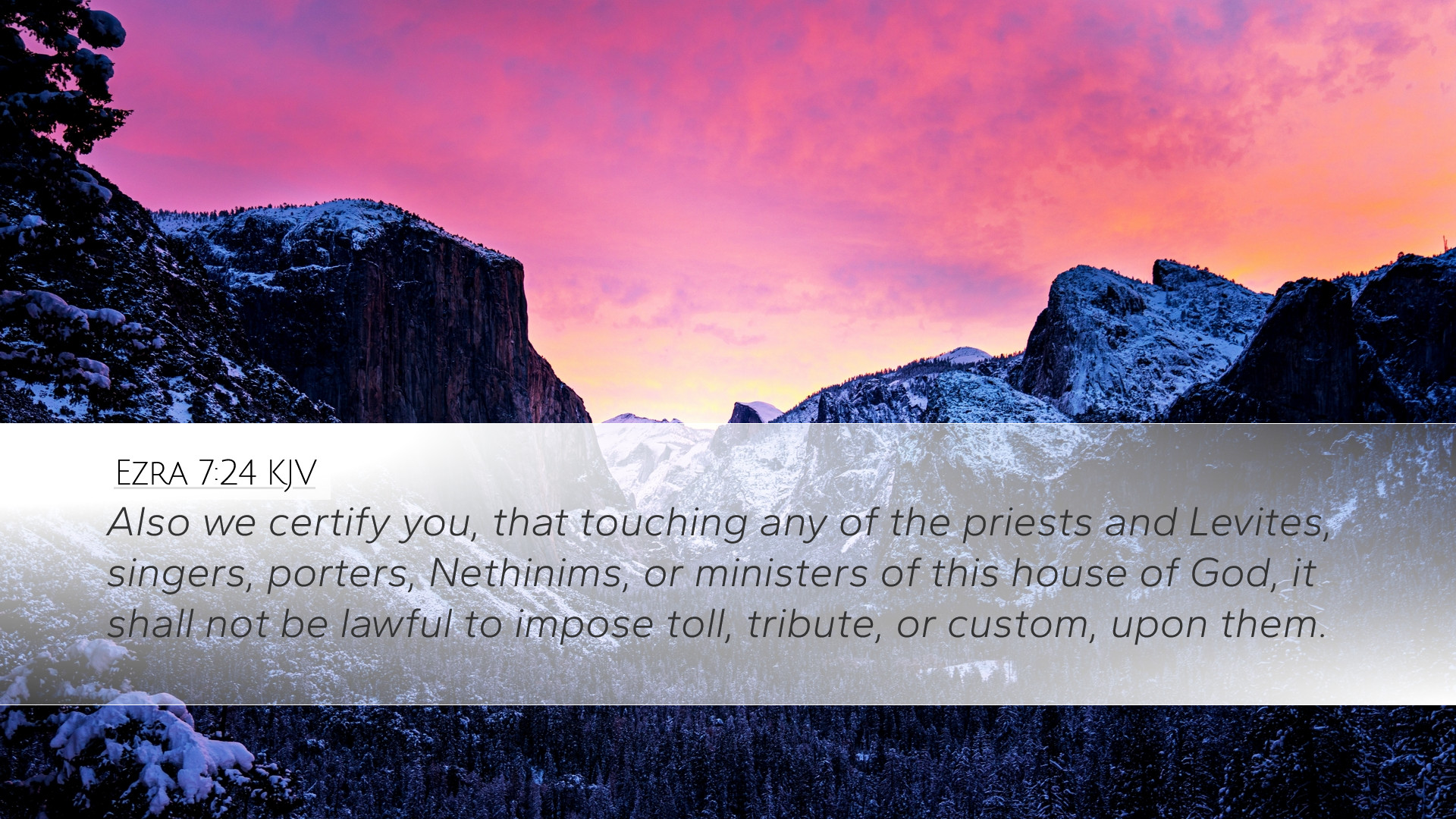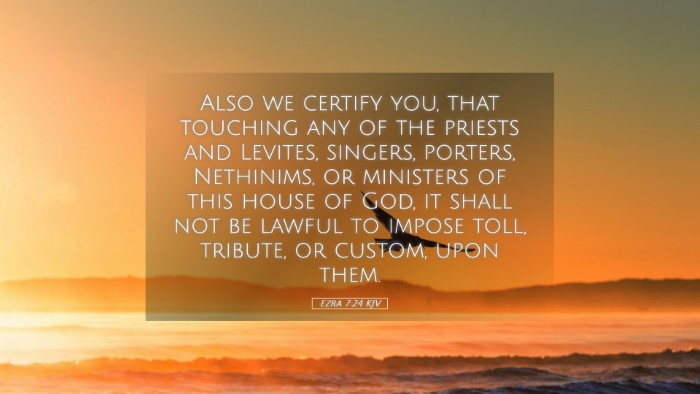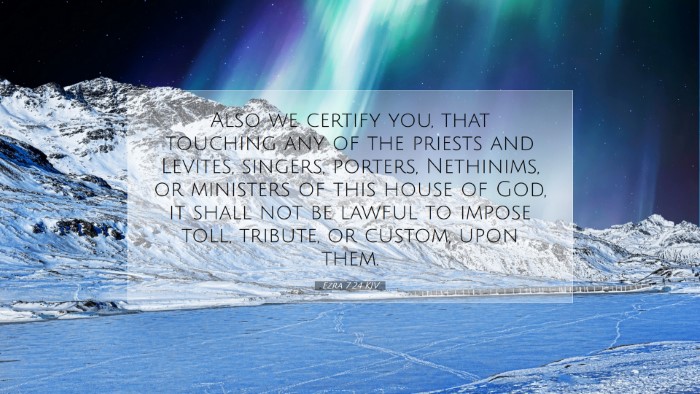Old Testament
Genesis Exodus Leviticus Numbers Deuteronomy Joshua Judges Ruth 1 Samuel 2 Samuel 1 Kings 2 Kings 1 Chronicles 2 Chronicles Ezra Nehemiah Esther Job Psalms Proverbs Ecclesiastes Song of Solomon Isaiah Jeremiah Lamentations Ezekiel Daniel Hosea Joel Amos Obadiah Jonah Micah Nahum Habakkuk Zephaniah Haggai Zechariah MalachiEzra 7:24
Ezra 7:24 KJV
Also we certify you, that touching any of the priests and Levites, singers, porters, Nethinims, or ministers of this house of God, it shall not be lawful to impose toll, tribute, or custom, upon them.
Ezra 7:24 Bible Commentary
Commentary on Ezra 7:24
Ezra 7:24 states: "Also we certify you, that touching any of the priests and Levites, singers, porters, nethinims, or ministers of this house of God, it shall not be lawful to impose toll, tribute, or custom upon them." This verse occurs within a critical context in the narrative of Ezra, reflecting both the governance and the spiritual significance of the priestly class and their exemption from taxation, which was a crucial aspect of maintaining the work of the Temple.
Overview of the Context
The chapter introduces Ezra, a priest and scribe, who has been granted authority by Artaxerxes, the King of Persia, to return to Jerusalem and oversee the spiritual restoration of the Jewish people following their Babylonian exile. The decree emphasizes the importance of the Temple and consolidates the role of the priests and Levites in leading this restoration.
Historical and Cultural Significance
The command issued in Ezra 7:24 reflects a broader theme in the Old Testament regarding the sacred service of the priests and Levites. As Albert Barnes points out, the exemption from tax signifies the recognition of their vital role in mediating between God and His people. It also emphasizes God's provision for those who dedicate their lives to His service.
Insights from Public Domain Commentaries
- Matthew Henry: Henry highlights that this tax exemption was not merely for the benefit of the priests and Levites but was intended to enable them to fulfill their divine calling without the distraction of worldly burdens. He notes that their commitment to the service of the Lord should be supported, allowing them to focus solely on their tasks in the Temple.
- Albert Barnes: Barnes elaborates on the historical context, stressing that this exemption was part of the restoration process of the Jewish community in Jerusalem. The king's decree underscores the significance of supporting spiritual leaders in a time of renewal and growth. This arrangement reflects the divine principle that those who minister spiritually should not be encumbered by secular demands.
- Adam Clarke: Clarke provides further theological insights, suggesting that such provisions highlight God's care for His servants. He emphasizes that those in ministry should be free from financial obligations that could interfere with their duties. Clarke mentions that this decree reinforces the respect and honor due to the priestly class and their essential role in the covenant community.
Theological Implications
Ezra 7:24 illustrates profound theological principles that extend beyond its immediate context. The idea of setting aside certain individuals for dedicated service to God correlates with the New Testament's teaching on the priesthood of believers. Just like the Levites, contemporary spiritual leaders are granted certain protections and privileges necessary for their ministry.
The Role of the Priesthood
The priesthood is portrayed as integral to the community’s spiritual health and covenant faithfulness. As noted by various commentators, the exemption from taxation serves to ensure that the priests and Levites can fully devote themselves to their God-ordained responsibilities. This illustrates a model that values spiritual leadership and recognizes its essential role in guiding the people towards holiness and righteousness.
Contemporary Applications
For modern pastors and scholars, this passage raises essential questions regarding the support of church leaders today. In many cultures, spiritual leaders bear the dual burden of spiritual responsibilities alongside financial worries. The historical exemption provided to the priests in Ezra's time can serve as a model for churches and communities aiming to support their leaders adequately.
- Support for Ministry: Churches should consider the financial and resource needs of their leaders, ensuring they can focus on prayer and the ministry of the Word without undue distractions.
- The Value of Spiritual Leadership: The narrative invites reflection on how contemporary communities perceive and support their spiritual leaders. Are they honored and provided for as biblical principles suggest?
- The Call to Dedicated Service: Believers can be encouraged through this passage to pursue their own spiritual responsibilities wholeheartedly, much like those who served as priests and Levites.
Conclusion
Ezra 7:24 speaks to the essential nature of the priesthood, the need for support within spiritual service, and God’s providence in ensuring that His servants can carry out their duties. Historical and contemporary interpretations reveal a consistent truth: those who are called to lead in spiritual matters require and deserve the community's support, enabling them to effectively minister to the congregation and honor God.
In reflecting on this verse, pastors, students, theologians, and scholars are encouraged to consider how they can foster a community that honors and supports its spiritual leaders while recognizing the divine principles established in the scriptures.


